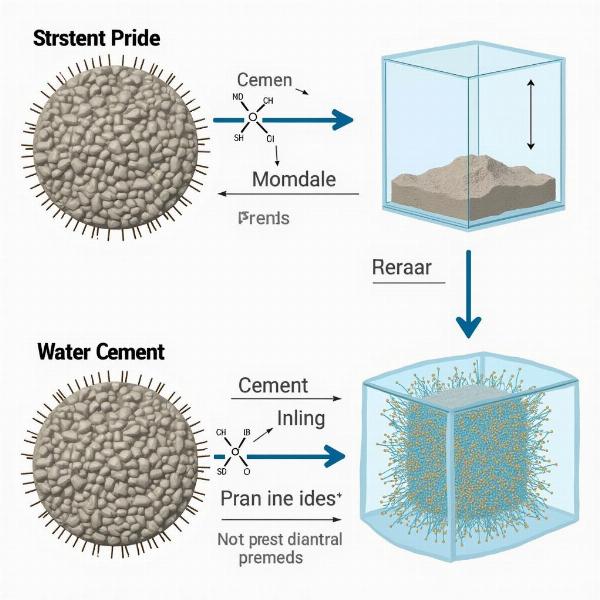Cementation, a crucial process in various fields, translates to “सीमेंटेशन” (seementeshan) in Hindi. This article delves into the multifaceted meaning of cementation, exploring its applications in construction, geology, and other domains. Understanding the nuances of this term is vital for anyone working in these fields, particularly when dealing with Hindi-speaking colleagues or clients.
Understanding Cementation in Different Contexts
The term “cementation” refers to the process of binding materials together using a cementing agent. This agent can vary widely depending on the application, ranging from concrete in construction to natural minerals in geological formations. The core concept, however, remains the same: creating a solid, unified mass from disparate particles. Think of it like glue, but on a much larger and more complex scale.
Cementation in Construction
In construction, cementation is synonymous with concrete work. The cement, mixed with aggregates like sand and gravel, forms the binding agent that holds the structure together. This process is fundamental to modern building practices, enabling the creation of everything from skyscrapers to sidewalks. The strength and durability of the final product depend heavily on the quality of the cement and the proper execution of the cementation process.
Cementation in Geology
Geological cementation is a natural process where dissolved minerals precipitate in the pore spaces between sediment grains, binding them together to form sedimentary rock. This process occurs over long periods, often under immense pressure and temperature. Common cementing agents include silica, calcite, and iron oxide. The type of cement influences the rock’s properties, such as its hardness and porosity.
The Chemical Processes Behind Cementation
Cementation isn’t simply a physical process; it involves complex chemical reactions. In construction, the hydration of cement creates a crystalline structure that interlocks with the aggregates. In geology, the precipitation of minerals from solution involves changes in ion concentrations and chemical equilibria. Understanding these chemical underpinnings is crucial for optimizing cementation processes and ensuring the longevity of the resulting structures or formations.
The Role of Water in Cementation
Water plays a vital role in cementation, particularly in construction. It’s not just a mixing medium; it actively participates in the chemical reactions that solidify the cement. The amount of water used significantly affects the final product’s strength and workability. In geology, water acts as a solvent, transporting the dissolved minerals that eventually become the cementing agents.
 Water's Role in Cementation
Water's Role in Cementation
Cementation and its Impact on Durability
The effectiveness of cementation directly impacts the durability of the final product, whether it’s a building or a rock formation. Proper cementation ensures resistance to weathering, erosion, and other environmental factors. In construction, this translates to longer-lasting structures that require less maintenance. In geology, it influences the landscape’s evolution over geological timescales.
Conclusion
Cementation, whether man-made or natural, is a fundamental process that shapes our built and natural environments. Understanding its meaning and intricacies is essential for various professions. From the construction of our homes to the formation of mountains, cementation plays a crucial role. The term “सीमेंटेशन” (seementeshan) encapsulates this vital process in Hindi, reflecting its importance across disciplines.
FAQ
- What is the basic principle of cementation? Cementation is the process of binding materials together using a cementing agent.
- How does cementation differ in construction and geology? In construction, it involves using cement to bind aggregates, while in geology, it’s a natural process where minerals cement sediment grains.
- Why is water important in cementation? Water is essential for the chemical reactions that solidify cement in construction and acts as a solvent for minerals in geological cementation.
- How does cementation affect durability? Effective cementation enhances the resistance of materials to weathering and erosion, increasing their lifespan.
- What is the Hindi word for cementation? The Hindi word for cementation is “सीमेंटेशन” (seementeshan).
Related Articles
Meaning-Hindi.in is your trusted partner for accurate and culturally sensitive Hindi translation services. We specialize in a wide range of translation solutions, including business and commercial documents, legal and certified translations, technical manuals, website localization, and educational materials. Whether you need quick translation services or specialized expertise in a particular field, Meaning-Hindi.in is here to help. Contact us today at [email protected] or +91 11-4502-7584 to discuss your translation needs and discover how our expertise can benefit your projects.